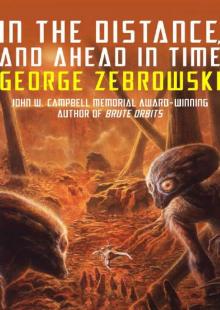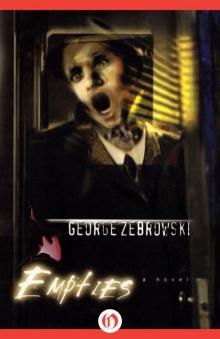- Home
- George Zebrowski
Brute Orbits Page 2
Brute Orbits Read online
Page 2
■
Yevgeny Tasarov liked to think that there was no one like him. Yet he also liked to believe that he was always on the lookout for his equals. It was not his fault that they came few and far between, and that recently they had not come at all. He sometimes wondered whether he was no longer able to recognize them.
Looking at the humanity around him, watching it haul itself through the vast changes of the last century and a half, Tasarov had concluded early in life that it was doing only what it could do, not what it should. That way was mostly beyond the capacities of concerted action; whenever humankind sought to agree and act in a large group, a curve of differing opinions appeared, as if someone had pressed a display button. The curve was always the same, with all the expected views present as if they were built-in. They probably were built-in.
Besides, it was hard to know what should be done with humanity; most were still content to live with no hindsight, less foresight, and little self-awareness. The whole species was still on automatic. Maybe it would never be a breakout species. So he had decided to do what he could do with the tools of thought and learned craft. He was the one-eyed man in the country of the blind, but he worried about having only one eye; two would have been better. Lawful or unlawful mattered little, as long as a project was practical and profitable, and not overly repellent. The craft made him happy; thought was hard work, but the reality of waiting pitfalls sharpened his alertness, as he brought the pleasure of craft to bear against failure.
In the fall of 2051, when he was twenty-five, he looked up at the overcast sky of upstate New York and knew what was possible, and that he would do it. It would require equipment and leadership. He already had the small inner group to persuade, but that would be the quickest part of it, indoctrinating them with the truth of the plan, to the point where it would work on their imaginations and dispel all doubt.
Was there any doubt in him? Of course there was, because the plan needed weaker links to make it work. Key moments might crumble before the fallible nature of men and lurking circumstance. One could not plan for the unexpected, except through redundancy, and hope there would be enough redundancy to swamp any sudden obstacles or reversals.
The way he had been caught was an example: with an old fashioned thumbprint from the money terminal he had emptied in Binghamton, New York, out of his own account! True, it was some money he had collected from the fading russmob in Philadelphia, for saving them millions in bank transfers, and legal, except for the intentionally wrong tax code he had entered; but some local cop had decided to do some old fashioned print dusting. In one hour they had his alias and ticket number on the bullet train to Manhattan, and the arrest had come at the Westchester stop.
He had felt humiliated by their easy luck, by the smallness of the offense, and by the doubts that had been sown in his mathematician’s brain about his own failing abilities. He should not have discounted some old cop’s eyesight. The one consolation was that they had arrested one of his aliases, not his core identity, which was still unknown to them and vastly more guilty. This would make it easier for him to execute his plan; they would not know who had planned it. He smiled to himself, admiring the beauty of the risk, knowing that up to a point they did not have to know his true self to stop him.
He told himself that a man losing his mind would be oblivious to it; he would not work to improve his long-chain reasoning; he would be blindly unquestioning of himself. His capture had been a freak event, and now his choice was to sit out five years or do something about it while his skills were still intact.
He knew what he wanted to try: to do whatever it would take to free him from a system that had learned too much about him, and which had to be coaxed back into forgetfulness. Once his plan had begun there would be no turning back; he would succeed or earn life without parole, or worse; death would come to him as a decision not to be taken alive.
Now, as he looked at the overcast sky from Dannemora prison, he saw what was to come and how it would be made to happen, as clearly as he had ever seen a mathematical proof; but whether the imperfect world would permit the order of events to run remained to be seen.
How much planning was enough to overcome chance imponderables? Never enough. But it was this very openness in the physical universe that made creative unpredictabilities possible; to ask for guarantees would be to ask for a rigidity that would be intolerable to a free mind. Constraints, yes, but a totalitarian determinism, no. The one honed skills, the other crushed them; the one made happy explorations possible, the other imposed iron mazes. Many a criminologist had reluctantly concluded that a high crime rate was a culture’s price of freedom.
One by one, his six comrades drifted toward him in the center of the exercise yard of the old prison, until finally they stood in various postures—facing him, facing away, and off to the side, so it would seem they were conversing only casually if they spoke.
Daylight brightened. He glanced up and saw the Sun rolling like a molten ball of hot iron in the ashes of the overcast sky. Suddenly it sailed out into a break. The still figures around him regained their shadows, which clung like spilled paint to the rough concrete.
The oldest lifer, Stanley King, whose leathery face had peered out from Coxsackie and here for over thirty years, said, “So, are you ready to tell us?”
Tasarov did not look at the men. He spoke to the shadows.
■
Philip Emmons didn’t remember killing his boss, a cafeteria manager at the Plato Research Center on the Moon. The court’s doctors had told him about it for three days. Then he had sat before the judge and prosecutor, thinking they could tell him whatever they wanted, show him all the evidence, but he still wouldn’t actually know inside himself that he had done it. They might just as well have been trying someone else. Even if he had been that man for a few moments, he was someone else now. Phil Emmons had never committed a crime in his life, despite the evidence, but they could tell him anything and he wouldn’t know if they had made it up. So to hell with the judge and all the lawyers, his own included; they weren’t interested in him, but in someone else.
“Whatever triggered you,” the judge said at the sentencing, “might happen again. We can’t let you out. No examination has been able to confirm your amnesia story, and there doesn’t seem to be anything really wrong with you.”
The judge had looked at him as if expecting him to agree, to say “Yes, I know, you have no choice, it’s all right and I would do the same in your place.” He had looked into the judge’s brown eyes, which were part of a wonderfully composed compassionate gaze that seemed genuine.
“Have you anything to say before I sentence you?” asked the judge.
Philip Emmons shook his head. “I have no idea what happened—if it did.”
The judge nodded. “There may be more to you than the innocent man you seem to believe yourself to be, but you must understand that we can’t let the rest of you roam free—if what you say is true.”
“What good does it do me to understand?”
The judge said, “Perhaps it will prevent that other part of you from ever coming out again. I sentence you to thirty years in the Orbits. And for the record, I don’t believe your story for one moment. No one does.” You’ll never be back, his eyes said, whoever you are. “Good-bye, Mr. Emmons.”
3
The Thinking Happiness
JUDGE OVERTON’S PRIVATE CHAMBER
* * *
“Sooner or later some half-baked historian will write a asinine book about me and call it Overton of the Orbits. He’ll look for motives in what we did, but they’ll be all wrong. No one was looking for rehab, or even humane treatment, as such. We only sought to separate the worst from the best, nothing more. The supermax prisons of the late twentieth and early twenty-first century were simply too costly for the ten to fifteen percent of inmates who had to be isolated. We had to get rid of them, because our worth exceeded the worth of these predators, pure and simple. The annual cost of incarcer
ation in supermax prisons, in fact any prisons, was more than what it cost to give someone a university education. Most convicts stood to be released from prisons, but these ten to twenty percent were our failures. Yes, our failures, as much as the law-abiding citizens were our social successes. But we just didn’t know what else to do with the worst failures. It was too late to prevent them. Remember that the prison gangs had their tentacles to the outside. They ran businesses and could even bring down local governments. They killed efficiently at a distance. By shipping them out, we broke their influence. Sure, in some profound sense we created their kind, but there was nothing else to do except get rid of them and start over.”
* * *
Yevgeny Tasarov’s leadership of the Dannemora breakout remained for many years an unequaled prison revolt—admired by later analysts for its detailed planning and understanding of the forces that would stand in its way, as well as for its implied criticism of social currents and goals.
North American culture of the 2050s, with its guilt-ridden efforts to lessen both the physical and social effects of global warming, its gated enclave suburbs surrounding the old cities, its often excessive concern with clean air, food, and water from basics factories, was particularly vulnerable to a convict force willing to do anything to get its way, because the culture was not willing to do as much to defend itself.
Tasarov knew this unwillingness, and counted on it. Just too many middle- and upper-class citizens were looking forward to lives of a century or more, and preferred to keep out of his way for as long as possible, and too many lower caste police and soldiers were reluctant to do their jobs and pay the price in blood when sent against him.
The prison population around Tasarov included men who were not considered dangerous. Most of them were inside for nonviolent, or slightly violent crimes; but what the medium-security prison did not take into account was the level of violence possible among these same prisoners, based on crimes for which they had not been convicted, and about which the prison authorities knew little or nothing.
Section Two of Dannemora was composed of violent criminals, mostly lifers, and it was a maximum-security prison.
All of which set the stage for an unexpected uprising, run by someone with military training, which could be put down only by an equal military response; but by then it would be too late.
The method, rehearsed and made second nature, was deceptively simple: a prison break by careful stages. At first, guards began to disappear. They were killed and their bodies hidden or destroyed whenever possible, using prison facilities. One day in the mess hall, all two dozen remaining guards were killed by the convicts next to them—by stabbing, breaking necks, even breaking backs—followed by escape through the kitchens, where those inmates who would not join in were also killed.
At each step, no one was left alive. Surveillance cameras were blinded at the last possible moment by cutting the cables to the outmoded monitoring stations. Within the hour, the entire administration of the medium-security section was dead. False orders were being given, and uniformed infiltrators were entering the maximum-security section to recruit a merciless army.
When the army came out into the nearby towns, they took the satellite radio and television stations and cable offices, and disabled all wireless communications. The entire area became a dead zone, with no communications going out to the rest of the state.
Armed with every weapon that could be seized from stores and private homes, the convicts forced marched to Lake George, where they seized a small resort community, murdered all the inhabitants, and used it as a base from which to filter away into the country, individually and in small groups, using all the false identities that could be manufactured. By the time the state sent a force against them, more than half were gone. The state force massacred the remaining convicts in revenge, to the point where it was difficult to identify the remains. All of this had been expected, along with the modest degree of success.
Tasarov was not identified among the burnt and dismembered bodies. He was long gone, back to Binghamton, where he retrieved a cache of false documents that he had placed there for a future emergency. For him, the entire break had been a leap into limited possibilities, and he had foreseen and accepted with grim resolve that the break’s second purpose, should it fail, would be to cover his own escape. He had hoped for the best, but second best was good enough. With his new identity, and his faith in his strategic skills restored, Tasarov went to Brazil, where another cache awaited him.
The breakout from Dannemora in the spring of 2051 brought to an end the prison-building boom that had begun in the 1990s as a series of economic ventures by local communities needing to replace lost industries, and confirmed a new system of incarceration for the next century. An Earth recovering from planetary warming and incessant diseases, from centuries of economic misconceptions, mismanagement, and corporate crime, had finally lost patience with devoting real estate to prisons that would only become colleges sponsoring rites of passage for the enraged underclasses, and which would be used as recruiting stations by organized crime.
Even as timed orbital sentences were being planned for the routine flow of criminals from the world’s many overburdened social systems, a debate was joined between the growing community of artificial intelligences that were already the planners behind most economies, and the advocates of purely human conceptions of justice. Eliminating criminal behavior in all its varieties still seemed impossible; it was part of all human cultures, present in all classes, reaching too deeply into all lawful societies to be easily ripped out. To face up to the truth, even with the objective tutelage of analysis by AIs, was beyond the capacities of human legislators, who insisted on retaining irrational attitudes toward criminal enterprises.
The self-serving nature of these attitudes was very clear to many human observers of the time. The same ability to see the truth had not been beyond several notable repudiations of “backward practices” in the five preceding centuries. Yet the power that Emiliano Zapata had despaired of restraining except at the point of another gun could not be taken away from human nature; it reserved the right to be violent and to break its own laws. The economically powerful reserved the right of violence and illegality. As the subversion of democracies by wealth continued, so was criminal behavior subverted. Laws had only human beings to carry them out; laws could not stand outside human nature and enforce justice. The sciences and the AIs attempted to remedy this lack of independent ground, so feared by the powerful, who always put vested interests above merit.
Unsentimental, uncommitted AIs saw organized nation states as legal criminalities, designed to exclude other forms, enforcing the power to define and identify what is criminal, answerable only to greater physical power. It was difficult for human beings in authority to dismiss entities that served them and worked with no hidden agendas. Increasingly, AIs saw law-abiding human beings as a luxury allowed for by benevolent surrounding powers: little enclaves of permitted decency, the seed-corn of ethical futures, whose people would be horrified by the national security states that supported them.
There came in the twenty-first century a complete professionalization of criminal industry, which did not see itself as criminal, but only as taking advantage of profit possibilities that were inside and outside of aged or inappropriate laws. Only the extreme edges of these criminal empires were visible, through those who were caught, those that the legal system felt compelled to catch and cast off. To the degree that this criminal economy had no clear boundary with the legal political and business systems, was the degree to which the criminal justice system failed to deal with the professionals, and contented itself with restraining the losers—the violent and the disturbed who had failed even within the criminal world—and sought to preserve a civil order under which both systems could function with some grace and profit.
But the vague line between the two worlds continued to shift as economic power shifted, and many observers concluded that the so-called le
gitimate order was one and the same with the top of the criminal pyramid. There was no other. There had never been another. The police served the political gangs in power, and they caught the small-timers who could not protect themselves. And of these they only caught about ten percent, and punished fewer than three percent. Many burglars lived full working lives and retired on their investments, as did successful pickpockets, confidence artists, data manipulators, vehicle thieves, credit and identity thieves, chemists and biologists feeding new habits, and muggers. It was easiest to catch the addicted and the passionately violent, who did not know what they were doing.
Humanity warred with itself over a vast territory. At one end sat a few saints; at the other, devils. In between, there lived mixtures of every degree. The police made life bearable for the gangs in power, and their pet middle-class, which was kept as a crime or political boss might shelter a son or daughter in a private school. The inheritors of power were always recruiting; and when the low were raised up, they behaved no differently than the powerful. Even when new generations were brought into the world without gross physical defects, with social advantages and education, crime only continued in a more civilized way. The creative willfulness of the hunter-gatherer was unstoppable, and perhaps stopping it should not be attempted.
As he rested poolside in Brazil, in the grip of what he liked to call his “thinking happiness,” Tasarov contemplated the ways in which societies were simply the expression of those who were in control, and how he might have traveled a more sheltered route if he had not insisted on staring reality full in the face instead of ducking. He might have been one of the powerful, by joining an elite, contributing what portion of excellence was in him, and then rationalizing that a human being could not do better. It might even be true, he sometimes thought.

 In the Distance, and Ahead in Time
In the Distance, and Ahead in Time Stranger Suns
Stranger Suns Black Pockets
Black Pockets Brute Orbits
Brute Orbits Cave of Stars (Macrolife Book 2)
Cave of Stars (Macrolife Book 2) Macrolife
Macrolife Empties
Empties Heart Of The Sun Star Trek 83
Heart Of The Sun Star Trek 83 The Sunspacers Trilogy
The Sunspacers Trilogy